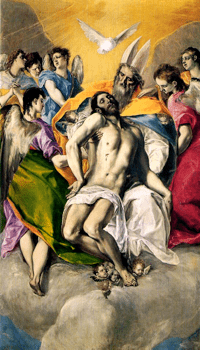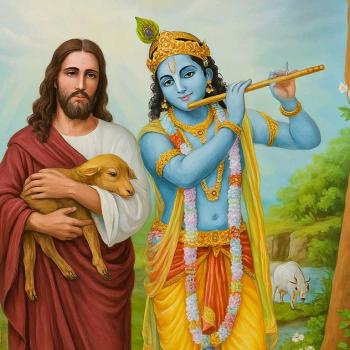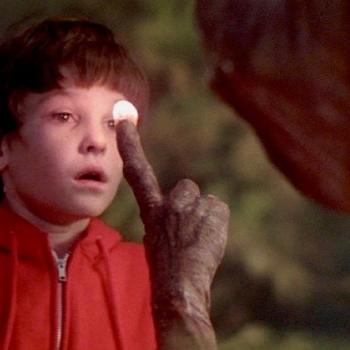By Matthew Potts - June 8, 2009
 There's a British movie from the early 1990s called Nuns on the Run in which two fugitives named Charlie and Brian dress up like nuns to escape being caught by the police. Charlie, raised Catholic, attempts to explain to Brian how the Trinity works, just in case anybody in the convent starts asking questions. After a long Abbott-and-Costello-type conversation, the flustered student Brian exclaims to his teacher Charlie, "Let me try and summarize this: God is his son. And his son is God. But his son moonlights as a holy ghost, a holy spirit, and a dove. And then they all send each other, even though they're all one and the same thing." And Charlie exclaims happily, "You've got it! You really could be a nun!" Later, when confronted by a child asking what the Trinity means, Brian - having difficulty now remembering Charlie's lesson - improvises, "It means God is like a shamrock: small, green, and split three ways."
There's a British movie from the early 1990s called Nuns on the Run in which two fugitives named Charlie and Brian dress up like nuns to escape being caught by the police. Charlie, raised Catholic, attempts to explain to Brian how the Trinity works, just in case anybody in the convent starts asking questions. After a long Abbott-and-Costello-type conversation, the flustered student Brian exclaims to his teacher Charlie, "Let me try and summarize this: God is his son. And his son is God. But his son moonlights as a holy ghost, a holy spirit, and a dove. And then they all send each other, even though they're all one and the same thing." And Charlie exclaims happily, "You've got it! You really could be a nun!" Later, when confronted by a child asking what the Trinity means, Brian - having difficulty now remembering Charlie's lesson - improvises, "It means God is like a shamrock: small, green, and split three ways."
I preached the first homily of my life on a Trinity Sunday. Looking back, I think the pastor of my church may have been passing the buck to me that Sunday. Preachers have always loved inviting guests into the pulpit on Trinity Sundays. Not the simplest topic to cover in ten minutes, it's easier to let the assistant or the seminarian tackle it. It's also sort of interesting for me to think of myself back then. In the scheme of things, it wasn't so long ago I suppose, just a few years, but I feel as if I've changed so much. Among other things, at that time I hadn't even met my wife yet, and in the best and most complicated ways, that relationship has transformed me more than any other experience I've had the last several years. A lot can happen in a few years, I guess.
I have to say, though, I'm not sure I've gained any clearer an insight into the Trinity since being ordained. Rowan Williams, the Archbishop of Canterbury, has said that before the immense, ineffable mystery of the universe, doctrine is simply the least stupid way we've found to speak about God. (I'm paraphrasing.) So I don't promise to reveal any Trinitarian truths in this short essay, but perhaps I can help our thinking about our Triune God become a little less stupid at least.
The Swiss theologian Hans Urs von Balthasar insisted that to be a human person is to be in relationship. The example he's famous for has to do with babies. Think of little babies - the first thing they recognize, the first clue they have that they exist at all, is the smile of their mothers. In its mother's smile, Balthasar said, a child first learns that it is a person, that it is contained, affirmed, and loved by someone else.
From our first thoughts, we know ourselves only as interconnected with and loved by other human beings. Each of our selves is in fact a bundle of relationships. When I call myself "Matthew," in some ways it's always kind of a shorthand for "husband of Colette, son of Dan and Miyoko, brother of Dan and Tom, etc. etc." And this is true of any of us, too, I think. Who we are actually changes when we fall in love or have a child or gain a friend, and that's as it should be. This is why it's hard for me to recognize that guy who preached his first homily on Trinity Sunday those years ago. That guy hadn't even met my wife, but today it's through my relationship with her (and with others too, but especially with her) that I've come to know myself as who I am. Paradoxically, we often become more fully ourselves through our relationships with one another.
Well, what does this have to do with the Trinity? The Greek theologian John Zizioulas says that the doctrine of the Trinity reminds us that God's very essence is relational, sort of like our own. God is not just the One, untouched and untouchable, not some solitary, aloof, grey-bearded superman up in the sky. If my name "Matthew" is a stand-in for husband, son, friend, priest, etc., the name "God" is likewise a stand-in for a set of divine relationships eternally binding God to Godself and to us. God is a community, not a monolith.
When we call God "Father, Son, and Spirit," maybe what we are really saying is that God is himself a relationship: not just some ideal orb of divinity floating out somewhere in space, but a communion in and of himself. Divinity, much like humanity, is thus an unending process of relationship, a continuing communion of giving and receiving.
Of course, the same could be said more simply with the words "God is love." What's love, anyway, but giving and receiving freely? Remember, as English bishop John Vernon Taylor says, we don't just say "God is a loving God"; or just say "God loves us." These things are of course true, but we Christians go a step further too. We say, "God is in himself love." God is like that mother's smile or that friend's embrace or that infant's laugh, because God is love, and perhaps that's why we recognize God so readily in those lovely things. To exist, to be, means to give and to receive, to be in love. This then is the great mystery of our Trinity, that it isn't really a mystery after all. It's not a description of what we don't know about God, but rather of what we do know: that God is love. When someone asks, "What does the mystery of the Trinity mean?" we might answer that question quite simply by saying that it means our God is not just a loving God; our God is love itself.




